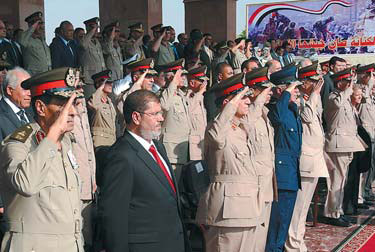Morsi sworn in as Egypt military pledges support
Updated: 2012-07-02 07:52
By Agencies in Cairo (China Daily)
|
|||||||||||
|
Egyptian President Mohammed Morsi (second from left) poses with the military council chief Field Marshal Hussein Tantawi (left) and ruling military generals. Handout / Egyptian Presidency Via Agence France-Presse |
Egypt's President Mohammed Morsi began his first full day in office on Sunday, but with his powers sharply circumscribed by the military that has ruled since Hosni Mubarak was ousted from power last year.
After being sworn in as the country's first freely elected civilian president on Saturday, Morsi formally received a transfer of power and pledge of support from the military.
But the 60-year-old's swearing-in ceremony took place at the constitutional court in Cairo, despite Morsi's wish that it take place before the now disbanded Islamist-led parliament.
The military dissolved parliament last month following a court order in what the powerful Muslim Brotherhood, from which Morsi stood down after his election, described as a "soft coup".
In Saturday's handover at Cairo's Hike Step base, Field Marshal Hussein Tantawi, the head of the Supreme Council of the Armed Forces, vowed to support the Islamist Morsi.
"We will stand with the new president, elected by the people," Tantawi said in a speech after an honor guard parade and a helicopter fly-past.
He bestowed upon the new president the highest military honor - the shield of the armed forces - and Morsi thanked the military, also pledging to support it.
"I accept the transfer of power," Morsi said at the same base where members of the once-banned Brotherhood had faced military trials under Mubarak.
People's longing
For Egypt's estimated 82 million people, the prospect of a continuing rift between the military and the Brotherhood, the country's largest political group, will only prolong the political instability that has rocked their nation since Mubarak's ouster last year.
After that, Egyptians have seen a wave of pessimism amid a declining economy, rising crime and a seemingly endless wave of protests, strikes and sit-ins.
The SCAF assumed legislative powers after it disbanded parliament and also formed a powerful national security council headed by the president but dominated by the generals.
The military also reserves the right to appoint a new constituent assembly should the one elected by the old parliament be disbanded by a court decision expected on Sept 1.
The Brotherhood insists that only parliament can appoint the assembly.
After taking the oath of office on Saturday, Morsi in a speech at Cairo University pointedly mentioned the "elected parliament" several times and said the army should resume its normal role.
"The elected institutions will return to fulfilling their roles. And the great military will devote itself to the task of protecting the country," he said.
He also put forward several of his international and domestic objectives, saying he would be a "servant of the people" in a "democratic, modern and constitutional state".
Internationally, he said Egypt would back the Palestinians and he also called for an end to the bloodshed in Syria. Morsi had spoken out forcefully in support of Palestinians during his election campaign.
"I announce from here that Egypt, its people and presidential institution stand with the Palestinian people until they regain all their rights," he said.
Israeli Prime Minister Benjamin Netanyahu has sent a letter to Morsi, urging him to uphold a peace treaty between the two countries, a source told AFP on Sunday.
AFP-AP
(China Daily 07/02/2012 page12)
Today's Top News
President Xi confident in recovery from quake
H7N9 update: 104 cases, 21 deaths
Telecom workers restore links
Coal mine blast kills 18 in Jilin
Intl scholarship puts China on the map
More bird flu patients discharged
Gold loses sheen, but still a safe bet
US 'turns blind eye to human rights'
Hot Topics
Lunar probe , China growth forecasts, Emission rules get tougher, China seen through 'colored lens', International board,
Editor's Picks

|

|

|

|

|

|






